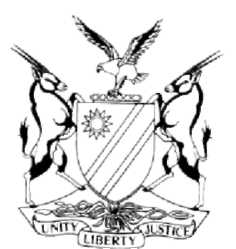
REPUBLIC OF NAMIBIA
CASE NO.: CR 53/2010
IN THE HIGH COURT OF NAMIBIA
In the matter between:
STATE
versus
JOSEPH NUMISEB
(HIGH COURT REVIEW CASE NO.: 2145/08)
CORAM: HOFF, J et VAN NIEKERK, J
Delivered on: 30 September 2010
REVIEW JUDGMENT
VAN NIEKERK, J [1] The accused pleaded guilty in the Magistrate's
Court, Otavi on a charge of housebreaking with intent to steal and theft. The questioning in terms of section 112(1)(b) of the Criminal Procedure Act, 51 of 1977, went as follows:
"Q: Why do you plead guilty?
A: Because I entered the house of the complainant but I did not broke her house.
Q: Did anyone force you to plead guilty?
A: No, I plead guilty because of the problem of my mother.
Q: What about your mother's problem?
A: My mother is mad and she burnt the house that's why I went there and
took those things. Q: When did this happen? A: 12 August 2008.
Q: Where?
A: Farm Namalinba
Q: It is alleged that you break and enter the house of Linus Somseb. Is that so?
A: I did not break it but at window there's whole (sic) I put my hand and
open the door. Q: So you found the house door closed? A: Correct.
Q: Did Linus Somseb give you permission to open his door and enter his house?
A: No.
Q: What did you want to do in his house?
A: I went inside to get blankets and food.
Q: Did you have permission to do that?
A: No.
Q: What did you take from that house?
A: Radio cassette player, Duvet, Macaroni, Candles and Soap.
Q: It is alleged in Count 1 that you took black and white duvet (N$ 399-00), Bauver CD player (N$ 500-00), portable CD radio (N$ 400-00) and three pairs of shoes valued at N$ 500-00, this total value is N$ 2 199-00. Is that so?
A: I took tape/CD player and Duvet and three pairs of shoes mens clothes and Bauver CD. CD player those I did not take them.
Q: Did you know that by taking those items without the owners consent you did wrong?
A: Correct.
Q: Did you also then realize that you could be punished for that? A: Correct.
[2] On review I posed the following question to the magistrate:
" 1. Did the accused admit that he entered the house with intention to steal? 2. Did the accused admit that he took the items in the charge sheet with the intention to deprive the owner of his ownership in them?"
[3] The Magistrate responded by stating:
"1. A reading from the line of questioning indicates that accused entered the house with intention to steal. As he went to take items to give to his mother to use and had no permission from the owner. I found it unnecessary to ask him why he took the items because this issue is already covered.
2. See point 1, so the conviction is in order and should be confirmed."
[4] I disagree with the learned magistrate that the questioning indicates that the accused entered the house to steal. His answers do not exclude that the entered the house with intention to take the items to use them. In the case of the non consumable items, e.g. the duvet, the cd player, clothes and shoes the intention could have been to only use them in which case the accused may have been guilty of a contravention of section 8 of the General Law Amendment Ordinance, 12 of 1956, (Removal of property for use without owner's consent).
As far as the consumable goods like the macaroni, candles and soap, are concerned, if he intended using them by consumption, there probably was an intention to steal.
[5] However at the section 112(1)(b) stage the court should not look at probabilities and make inferences. The point simply is that the magistrate is required to ask such questions which will contribute to establishing whether the accused admits the allegations in the charge sheet. This issue was comprehensively dealt with the S v Nashapi 2009 (2) NR 794 HC. The magistrate is directed to study this judgment and apply it. The mere admission that the goods were taken without permission of the owner does not go far enough. It does not necessarily amount to an admission that the goods were taken with the intention to deprive the owner permanently of his ownership therein.
[5] As the sentence in this matter has already been served, it would be unjust to act in terms of section 312 of the Criminal Procedure Act. The following order is therefore made: The conviction and sentence are set aside.
VAN NIEKERK, J
I concur.
HOFF, J